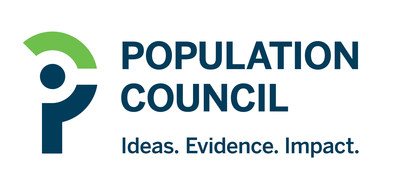NEW YORK, Jan. 3, 2018 /PRNewswire/ -- The Population Council today announced that the U.S. Food and Drug Administration (FDA) has accepted for review its one-year Nestorone® / ethinyl estradiol vaginal ring for pregnancy prevention. If approved, the contraceptive vaginal ring would be the first contraceptive option that provides a full year of protection against unintended pregnancy while fully under a woman's control.

Women can insert and remove the soft, flexible, 2 ¼ inch silicone ring by themselves. In formulating the ring, Population Council researchers combined a widely used estrogen with a new progestin (Nestorone®) to develop a single ring that can prevent ovulation for an entire year (13 cycles). During each cycle, the ring is left in place for 21 days and removed for 7 days. The one-year contraceptive ring does not require refrigeration, which is particularly important for distribution and use in low-resource settings.
"More than 214 million women worldwide want to avoid pregnancy but are not using modern contraception. And in the U.S., nearly half (45%) of all pregnancies that occur each year are unintended," said Population Council President, Julia Bunting. "Providing women with contraceptive quality, choice, and control is essential for reducing unintended pregnancies and improving health outcomes for women and their families worldwide."
FDA review of the new ring is based in part on data from 17 clinical trials, including two pivotal Phase III clinical trials with 2,308 women across 27 study sites worldwide.
Women in the Phase III trials of the new ring ranked it highly in terms of convenience, ease of use, and comfort. Nearly 9 in 10 women (89%) surveyed were satisfied with the ring as a method of contraception. Most participants surveyed found the ring easy to use and experienced no change in sexual pleasure or frequency when using the ring. The majority of women and their partners reported that they did not feel the ring when it was in place.
"The contraceptive vaginal ring represents the Population Council's latest effort to expand women's access to quality reproductive health care, even in low-resource settings where access to health care providers and reliable sources of refrigeration are limited," said James Sailer, vice president and executive director of the Population Council's Center for Biomedical Research. "Obtaining U.S. FDA approval would be the first step toward expanding access to the ring worldwide, through licensing and marketing partnerships that ensure affordable access for women."
Studies of the new ring were conducted by the Population Council, members of its International Committee for Contraception Research, and the Contraceptive Clinical Trials Network of the Eunice Kennedy Shriver National Institute of Child Health and Human Development (NICHD), U.S. National Institutes of Health (NIH). Project donors have included the United States Agency for International Development (USAID), NICHD, the Bill & Melinda Gates Foundation, the Avis and Clifford Barrus Medical Foundation, the World Health Organization, and the Population Council.
The Population Council has developed and licensed some of the most widely used long-acting, reversible contraceptives in the world, including the Copper T intrauterine device; Mirena®, the levonorgestrel-releasing intrauterine system; and the implants Jadelle® and Norplant®. More than 170 million women worldwide are currently using contraceptive methods based on the Population Council's technology. Council researchers continue to advance a rich pipeline of innovative options to meet the sexual and reproductive health needs of women, men and young people around the world.
More information is available at: http://www.popcouncil.org/cbr.
About the Population Council
The Population Council confronts critical health and development issues—from stopping the spread of HIV to improving reproductive health and ensuring that young people lead full and productive lives. Through biomedical, social science, and public health research in 50 countries, we work with our partners to deliver solutions that lead to more effective policies, programs, and technologies that improve lives around the world. Established in 1952 and headquartered in New York, the Council is a nongovernmental, nonprofit organization governed by an international board of trustees.
![]() View original content with multimedia:http://www.prnewswire.com/news-releases/population-councils-one-year-contraceptive-ring-advances-to-fda-review-300576681.html
View original content with multimedia:http://www.prnewswire.com/news-releases/population-councils-one-year-contraceptive-ring-advances-to-fda-review-300576681.html
SOURCE Population Council


























